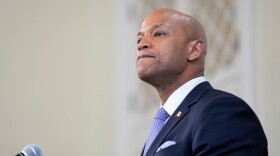New state financial projections anticipate Maryland will have to close a near $1.5 billion budget shortfall in fiscal year 27, which begins June 2026.
When lawmakers left the statehouse in April, they were anticipating entering fiscal year 27 with a $300 million deficit, a considered manageable gap relative to the state’s over $60 billion budget.
But that story has changed largely due to federal tax revisions within President Donald Trump’s “One, Big Beautiful Bill Act,” unforeseen deficiencies in the current budget year and increased state spending.
The state ended last fiscal year with a $271 million cash surplus, but the General Assembly’s Fiscal and Policy Coordinator David Romans says those funds and more will be needed to cover prior year deficiencies.
“You have $695 million in deficiencies that need to be paid for in [fiscal year] 26, so that eats up the cash balance, and we actually assume you’d take a couple hundred million out of the Rainy Day Fund to cover the rest of those deficiencies, and that gets you a zero cash balance in [fiscal year] 26” Romans told state lawmakers Wednesday.
About half of those deficiencies come from prior year costs, while roughly a quarter is due to health care provider reimbursements.
Carrying a zero cash balance into fiscal year 27 is already poised to put the state at a $321 million disadvantage, but the “One, Big Beautiful Bill Act’s” new tax provisions are anticipated to put the state out another $371 million.
The corporate tax cuts, raising the State and Local Tax (SALT) deduction cap and other federal tax code changes are lowering revenue capabilities for states nationwide, and Maryland lawmakers will consider whether to permanently decouple from the new provisions in the “One, Big Beautiful Bill Act” next legislative session.
State spending is also anticipated to be up $778 million in fiscal year 27, which Romans attributes to “not one single item,” but a “few big items.”
The largest of those items is a rather dramatic jump in utilization of behavioral health services by adults enrolled in Medicaid, which is anticipated to cost the state $217 million.
Other increased costs are due to teacher retirement, more Supplemental Nutrition Assistance Program (SNAP) administrative costs being shifted onto the state, Medicaid administrative costs and employee health insurance.
Romans says tapping the state’s Rainy Day Fund and Fiscal Stabilization Fund — which Gov. Wes Moore used to fund SNAP benefits and food assistance during the federal government shutdown — would reduce the projected FY 27 deficit by two-thirds.
While he presented it as an option, Romans advised against the move out of fear of draining reserve funds when they could be needed during a recession, or perhaps more pertinent, in FY 28.
“That's where you have this more than doubling of your structural and cash budget challenge,” Romans said.
While revenues are anticipated to increase by roughly $1 billion in fiscal year 28, spending is expected to grow by nearly $3 billion – over $2 billion of that growth is due to the state’s ambitious public education transformation plan known as the Blueprint.
When Maryland was in good fiscal times, it socked away substantial amounts of cash into the Blueprint fund to help pay for the program’s implementation, but those funds are expected to run out by the end of fiscal year 27.
This means in fiscal year 28, over $2 billion will be needed from the state’s General Fund to help pay for the program, and that number will only grow over the years.
Romans calls this backfilling to cover the cost of Blueprint implementation with General Funds the “fund swap,” and it could wreak havoc on the budget in the out years.
“Even if you froze spending on everything, all you tried to do is do the Blueprint fund swap, you don't have enough revenue to fully cover it,” Romans told lawmakers. “There will be a need for pretty steep cuts across the budget in fiscal 28 and/or some revenues in fiscal 28 to bring 28 into structural balance.”
Lawmakers will receive another fiscal forecast next month and will begin official budget and federal tax code decoupling talks in January when the General Assembly convenes.








